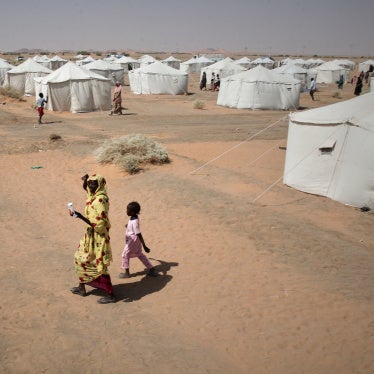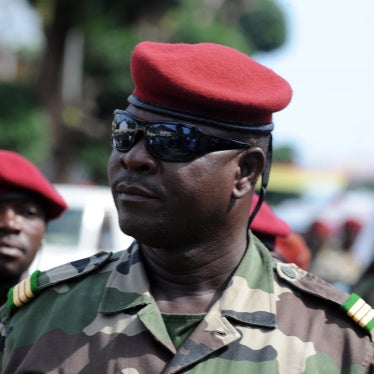(Washington D.C.) - Government forces in Côte d’Ivoire, their allied militias and New Forces rebels alike are committing serious abuses against civilians with impunity. These abuses and the impunity that fuels them raise serious concerns about the potential for violence in the run-up to the October elections.
The 36-page report, "Because They Have the Guns... I'm Left With Nothing," documents human rights abuses against civilians that were committed by state security forces, their allied militias and the rebel New Forces (Forces Nouvelles) between November and March. These armed groups have preyed on civilians through intimidation and outright force.
"Pro-government forces and rebels alike have been free to abuse, harass and intimidate civilians," said Peter Takirambudde, Africa director at Human Rights Watch. "This impunity raises the risk of violence in the pre-election period and threatens the ability of individuals to exercise their political rights."
Since 2002, Côte d'Ivoire has been split between the government-controlled south and rebel-held north, with a buffer zone in between patrolled by United Nations peacekeepers and French forces. A succession of political agreements have failed to move beyond a "no peace, no war" stalemate. Elections scheduled for October 30, 2005, were canceled, and the United Nations agreed that President Laurent Gbagbo could remain in office for another year, providing that free and fair elections are held.
Elections are now scheduled to take place before October 31, 2006, under a road map established by the International Working Group on Côte d'Ivoire. In December, the U.N. Security Council urged the new prime minister, Charles Konan Banny, to implement this road map as soon as possible. However, Côte d'Ivoire heads into the pre-election period deeply divided, with political parties loosely organized along ethnic and religious lines. Security forces, in the north and south, often represent the interests of particular political parties.
Human Rights Watch found that members of the government security forces continue to prey on civilians by extorting, robbing and, at times, beating those they are entrusted to protect. These abuses typically take place under the guise of routine security checks during which police and gendarmes inspect the identity papers of individuals they stop at road blocks, in markets or other public places. Nationals of neighboring states and Ivorians from the north of the country are particularly signaled out for abuse, on the basis of suspicions that they support the northern rebels. Individuals from these groups are targeted and frequently subjected to arbitrary arrests, beatings, torture and sometimes murder, particularly during episodes of heightened political tension.
In the northern part of Cote d'Ivoire, Human Rights Watch found that New Forces rebels routinely extort money from civilians through threats, intimidation or outright force. In the zone administered by the New Forces, citizens accused of common crimes are sometimes subject to arbitrary arrest by rebel-administered police officers, and the imposition of custodial "sentences" of questionable legal authority continue to occur with no independent judicial or executive checks.
The report notes how neither the Ivorian authorities, the leadership of the rebel New Forces, nor the international community has taken meaningful steps to bring to justice those responsible for serious violations of international human rights and humanitarian law in Côte d'Ivoire. Unless measures are taken now to combat impunity, a repeat of the violence experienced during the 2000 presidential and parliamentary elections could occur. In 2000, political, ethnic and religious violence in the run-up to the elections resulted in the deaths of more than 200 people and injuries to hundreds more.
Human Rights Watch recommended that the U.N. Security Council authorize wider application of travel and economic sanctions against individuals identified as responsible for serious human rights abuses. The organization said the council should promptly publish and discuss the recommendations of a U.N. Commission of Inquiry's report into human rights violations committed since 2002 - a report that has not yet been made public, even though it was submitted to the Security Council in December 2004.
"The international community should develop a concrete strategy to combat the pervasive impunity that could lead to pre-election violence in Côte d'Ivoire," said Takirambudde.
The International Criminal Court should promptly dispatch a mission to Côte d'Ivoire to investigate government and rebel forces accused of serious crimes. The report also calls on the government of Côte d'Ivoire and the New Forces to investigate and punish, in accordance with international standards, crimes committed in their area of effective control, including extrajudicial execution, torture, and the harassment and extortion of civilians.
"Both the government and the rebels must take definitive actions to show the perpetrators of serious crimes that the era of impunity is over," said Takirambudde. "As Côte d'Ivoire prepares for elections, the Ivorian authorities and rebel commanders must make it clear that further abuses will not go unpunished."
|
News Release
Côte d’Ivoire: Abuses Threaten Run-Up to Elections
Impunity Fuels Serious Violations by Government, Rebel Forces
Your tax deductible gift can help stop human rights violations and save lives around the world.
Region / Country
Most Viewed
-
February 4, 2026
China: Repression Deepens, Extends Abroad

-
November 25, 2019
A Dirty Investment

-
March 29, 2021
“Everything I Have to Do is Tied to a Man”

-
September 18, 2024
Indonesia: Racism, Discrimination Against Indigenous Papuans

-
September 20, 2017
Iraq/KRG: 1,400 Women, Children From ISIS Areas Detained




